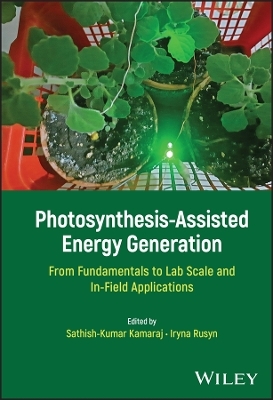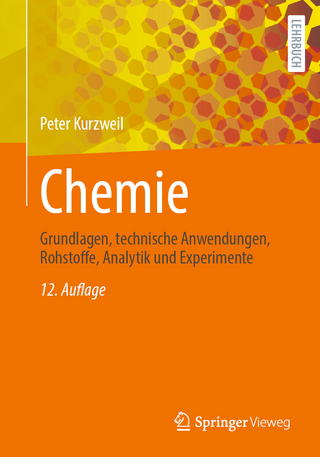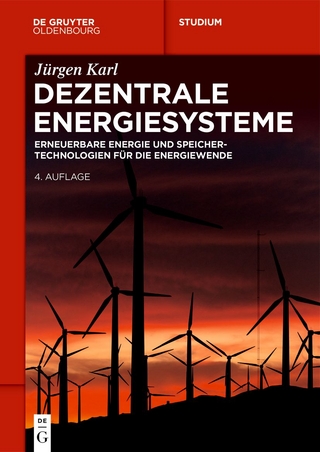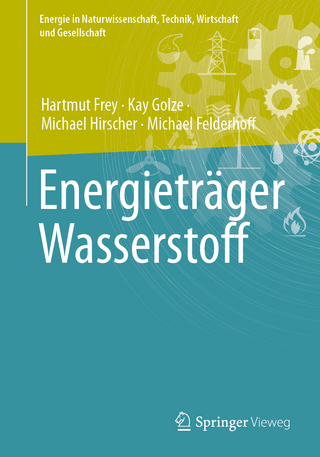
Photosynthesis-Assisted Energy Generation
John Wiley & Sons Inc (Verlag)
978-1-394-17230-6 (ISBN)
Bridging the knowledge gap between the fundamentals and the technological advances in biological photosynthesis-assisted energy generation, Photosynthesis-Assisted Energy Generation explores the various diverse light-harvesting biological systems for electricity generation and explains the fundamentals and applications from lab-scale to in-field. The text discusses the fundamentals of electron transfer mechanisms in photosynthetic systems, basic principles of bioelectricity generation, and materials involved in the construction of fuel cells, including not only the impact of higher plants, but also anoxygenic and oxygenic photosynthetic bacteria and microalgae on the performance of photosynthesis-assisted power generation systems.
A timely resource, the text features case studies on emerging topics such as mosses in power generation on green roofs and photo-bioelectrochemical fuel cells for antibiotics and dyes removal, along with discussion of sustainability issues when scaling up bio-photo-electrochemical systems.
Edited by two highly qualified and accomplished academics with significant research experience in the field, Photosynthesis-Assisted Energy Generation includes information on:
Role of functional materials involved in photosynthesis-assisted power generation and non-noble electrocatalysts as air cathodes in biocells
Electricity generation and intensified synthesis of nutrients by plant-based biofuel cells using duckweeds as biocatalysts
Algae-based microbial fuel cells, photosynthetic bacteria-based microbial fuel cells, and bryophyte microbial fuel cell systems
Progress and recent trends of application of low-energy consuming devices and IoT based on photosynthesis-assisted power generation
Plant-based microbial fuel cells for bioremediation, biosensing, and plant health monitoring
With full coverage of an attractive renewable energy generation system, Photosynthesis-Assisted Energy Generation is an essential resource on the subject for researchers and scientists interested in alternative renewable energetics and photosynthesis-assisted energy generation processes utilizing microorganisms, algae, plants, and other bioinspired materials.
Dr. Sathish-Kumar Kamaraj is a Full Professor of C ES TC FOR at the Instituto Politécnico Nacional (IPN)-Centro de Investigación en Ciencia Aplicada y Tecnología Avanzada, Unidad Altamira (CICATA-Altamira), Altamira, Tamps., in Mexico. He has developed various working prototypes of bioelectro-chemical systems. Dr. Iryna Rusyn is a Doctor of Biological Sciences in Biotechnology, Associate Professor, and Head of Scientific Research Electrobiosystems for obtaining Plant-microbial bioelectricity at Lviv Polytechnic National University, Department of Ecology and Sustainable Environmental Management in Ukraine.
List of Contributors xv
Preface xxi
Acknowledgments xxiii
Part I The Basic Principle and Fundamentals of Photosynthesis-Assisted Power Generation 1
1 Introduction to Electron Transfer Mechanisms in Photosynthesis-Assisted Power Generation 3
Nancy González Gamboa
1.1 Introduction 3
1.2 Electron Transfer Mechanism 4
1.3 Photosynthesis in the Electron Transfer Mechanism 8
1.4 Technologies In Which the Photosynthesis Process Can Be Applied for Energy Generation 12
1.5 Future Vision of the Use of Photosynthesis in Energy Generation 15
1.6 Conclusion 17
2 Role of Functional Materials Involved in the Photosynthesis-Assisted Power Generation 21
Manoj K. Srinivasan, Pratima B. Jayarm, Ravichandiran Ragunath, Briska Jifrina Premnath, Nalini Namasivayam, and Sathish-Kumar Kamaraj
2.1 Introduction 21
2.2 Plant-Mediated Microbial Fuel Cells 23
2.3 Applications of PMFC technology 27
2.4 Development of Electrodes and Membranes for Plant Microbial Fuel Cells 28
2.5 Challenges and Future Perspective 41
2.6 Conclusion 42
3 An Overview of the Non-noble Electrocatalysts as Air Cathodes in Biocells 57
Omar Francisco G. Vazquez and Ma. Del Rosario M. Virgen
3.1 Introduction 57
3.2 Operation and Structure of the Aerated Cathode 59
3.3 Importance of Materials in the Construction of Catalytic Electrodes for Hydrogen Reduction 62
3.4 Disadvantages of Noble Metal Electrocatalysts 63
3.5 Synthesis of Non-noble Electrocatalysts and Their Performance 65
3.6 Conclusions and Perspectives 70
4 Configurations of Plant-Based Microbial Fuel Cell System and Its Impact on Power Density 77
Mohnish M. Borker
4.1 Introduction 77
4.2 Operating Principle 78
4.3 PMFC Configurations 79
4.4 Cylindrical PMFC 82
4.5 Conclusion 85
5 The Critical Impact of Photosynthetic Pathway of Plants on the Performance of PMFC 87
Julio C. Gómora-Hernández, Nicolas Flores-Álamo, L.A. Díaz-Colín, S. Ventura-Cruz, and Miriam J. Jiménez-Cedillo
5.1 Introduction 87
5.2 Brief History of PMFC 89
5.3 Conformation of Conventional PMFC, Electrode Materials, and Basic Elements 90
5.4 Bacterial Community 92
5.5 Rhizodeposition Process and Photosynthetic Pathways 94
5.6 The Role of C3, C4, and CAM Plants in PMFC 97
5.7 The Role of Wetland and Drought-resistant Plants in PMFC 109
5.8 Trends and Future Perspectives 110
5.9 Conclusions 111
Part II The Diversity of Photosynthesis-Assisted Power Generation 125
6 Insights on Algae-based Microbial Fuel Cells 127
Nivedha Jayaseelan, Vennila Lakshmanan, Kanimozhi Kaliyamoorthi, Olikkavi Subashchandrabose, Tani Carmel Raj, and Sathish-Kumar Kamaraj
6.1 Introduction 127
6.2 Algae-based Microbial Fuel Cells (AMFCs) 129
6.3 The Implementation of Algae in MFCs 132
6.4 The Wastewater Treatment Using Algae-assisted MFCs (AMFCs) 137
6.5 Photosynthetic Algae Microbial Fuel Cell (PAMFC) 140
6.6 Conclusion 143
7 An Overview of Photosynthetic Bacteria-Based Microbial Fuel Cells 153
Kuppurangan Gunaseelan, Moogambigai Sugumar, and Selvaraj Gajalakshmi
7.1 Introduction 153
7.2 Ecology, Metabolism, and Extracellular Electron Transport in OPB and APB 155
7.3 Advantages of the APB over Algae and Cyanobacteria 162
7.4 Optimization of Light Source for Sustainable Electricity Production 163
7.5 Governing Factors and Bottlenecks of Photosynthetic Bacteria-Based Microbial Fuel Cells 167
7.6 Conclusion 168
8 The Development of Bryophyte Microbial Fuel Cell Systems 177
Iryna Rusyn, Wilgince Apollon, and Soumya Ghosh
8.1 Introduction 177
8.2 Moss-Driven Microbial Fuel Cells 180
8.3 ²ndoor Application of Moss-PMFC 184
8.4 Bryophyte PMFC as a Source of Photosynthesis-Associated Energy Generation on Green Roofs 185
8.5 Perspectives of Bryophyte PMFC 189
8.6 Conclusions 190
9 Duckweeds as Biocatalysts in Plant-based Biofuel Cell 199
Yolina Hubenova and Mario Mitov
9.1 Introduction to Plant-based Microbial Fuel Cells 199
9.2 Biofuel Cells Using Aquatic Higher Plants as Anodic Biocatalysts 200
9.3 Influence of the Electrode Polarization on the Plants' Metabolism 208
9.4 Components of Photosynthetic Systems Involved in the Direct EET to the Anode 212
9.5 Future Challenges and Concluding Remarks 216
10 Low Power Voltage Acquisition System for Photosynthesis-Based Microbial Fuel Cells 221
Victor A. Maldonado-Ruelas, Raúl A. Ortiz-Medina, Sathish-Kumar Kamaraj, Wilgince Apollon, and Marco A. Vázquez-Gutierrez
10.1 Low Power Sources 221
10.2 Voltage Acquisition System 224
10.3 Field Application of the Acquisition System 232
10.4 Conclusions 235
Part III Lab-Scale and Infield Application of Photosynthesis-Based Microbial Fuel Cells 239
11 Plant-Based-Microbial Fuel Cells for Bioremediation, Biosensing, and Plant Health Monitoring 241
Roshan Regmi, Vinh Nguyen, and Ranjita Sapkota
11.1 Introduction 241
11.2 Bioelectricity Generation Using a Plant-based Microbial Fuel Cell 242
11.3 PMFCs for Bioremediation 243
11.4 PMFCs for Control of Biogas Emission 245
11.5 PMFCs-based Sensors 247
11.6 PMFCs for Plant Health Monitoring 247
11.7 Design Criteria for Plant-based Microbial Fuel Cells 248
11.8 Conclusion and Recommendation 251
12 Progress and Recent Trends of Application of Low-energy Consuming Devices and IoT Based on Photosynthesis-assisted Power Generation 261
Edith Osorio-de-la-Rosa, Mirna Valdez-Hernández, Rosa M. Woo-García, and Javier Vázquez-Castillo
12.1 Introduction 261
12.2 Promising Plants for Use as Energy Sources 263
12.3 Understanding Energy Harvesting 267
12.4 Low-consumption Electronic Devices for IoT Applications 268
12.5 Precision Agriculture 275
12.6 Conclusion and Future Perspectives 277
13 Problems of Improving Organics, Ammonium and Phosphorus Treatment with Algal-assisted MFCs 285
Nguyen Trung Hiep
13.1 Introduction 285
13.2 Components and Designs of Algal-assisted MFCs 286
13.3 Factors Influencing the Performance of the Algal-assisted MFCs System 291
13.4 Limitations and Future Perspectives of A-MFCs 299
13.5 Conclusion 301
14 Development and Achievements of Photo-bioelectrochemical Fuel Cell (PBFC) in Metal, Antibiotics, and Dyes Removal 311
Anwesha Mukherjee
14.1 Introduction 311
14.2 Microorganisms Involved in Metal, Antibiotic and Dye Removal 313
14.3 Mechanism of Toxic Compounds Removal Through Photo-Bioelectrochemical Fuel Cell (PBFC) 316
14.4 Recent Developments in PBFC for Metal, Antibiotics, and Dye Removal 322
14.5 Challenges and Future Outlook 326
14.6 Conclusion 328
15 Agriculture-based Crop in PMFCs for the Futuristic Sustainable Protected Agriculture 337
Divya Shanmugavel, Omar Solorza-Feria, and Sathish-Kumar Kamaraj
15.1 Introduction 337
15.2 Challenges for Agriculture 339
15.3 Development of Plant Microbial Fuel Cells 341
15.4 Agriculture-Based Crops in PMFCs 343
15.5 Development of Green Energy System to Promote Sustainable Agriculture 350
15.6 Conclusion 351
Part IV Sustainable Issues Associated with Photosynthesis-Assisted Power Generation 357
16 An Overview of Sustainable Issues Associated with Bio-Assisted Power Generation Systems 359
Lakshmipathy Muthukrishnan, Sathish-Kumar Kamaraj, Manuel Sánchez-Cárdenas, and Luis Antonio Sánchez-Olmos
16.1 Introduction – Paradigm Shift toward Sustainability 359
16.2 Sustainable Systems 360
16.3 Challenges and Motivations 363
16.4 Biological Solution 365
16.5 Life Cycle Assessments (LCA) 366
16.6 Composite Sustainability Indices (CSI) 367
16.7 Construction of a CSI 368
16.8 The Concept of Biorefinery and their Applications 370
16.9 Biorefinery Technology 371
16.10 Circular Economy 376
16.11 Limitations 378
16.12 Conclusions 378
References 380
Index 385
| Erscheinungsdatum | 07.02.2024 |
|---|---|
| Verlagsort | New York |
| Sprache | englisch |
| Gewicht | 826 g |
| Themenwelt | Naturwissenschaften ► Chemie ► Technische Chemie |
| Technik ► Elektrotechnik / Energietechnik | |
| ISBN-10 | 1-394-17230-3 / 1394172303 |
| ISBN-13 | 978-1-394-17230-6 / 9781394172306 |
| Zustand | Neuware |
| Informationen gemäß Produktsicherheitsverordnung (GPSR) | |
| Haben Sie eine Frage zum Produkt? |
aus dem Bereich


